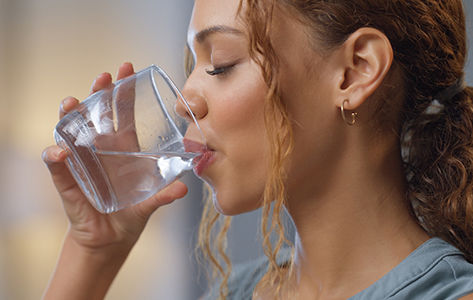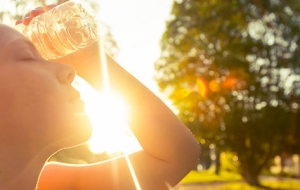
More than half of our body weight is made up of water, so it probably comes as no surprise that water works harder in our bodies than just quenching our thirst. It keeps every single system functioning properly, from our heart and brain to our muscles and kidneys. But how do we know if we’re drinking ‘enough’?
Lydia Barbara, MD, a primary care physician at Atlantic Health System, breaks it down. “Water is vital to our health. It keeps our organs functioning properly, hydrates tissue and joints, delivers nutrients to cells, removes waste, and maintains body temperature. The amount of water a person needs is based on multiple factors — age, weight, activity level, lifestyle, even how much time you spend outdoors in the heat.”
How Much Water Is Enough?
One reliable way to monitor your hydration level is by observing the color of your urine first thing in the morning. Light yellow urine means you are more hydrated. Dark-colored urine, resembling the color of apple juice, is more concentrated, showing you are dehydrated.
“When you’re well-hydrated, your body functions better with improved sleep, cognition, mood, better-looking skin, and more energy. You may even feel less hungry with better digestion and more regular bowel movements,” says Dr. Barbara. “Conversely, dehydration can lead to feeling tired and lethargic. It can cause dry eyes and mouth, lightheadedness, and even toxic buildup due to infrequent urination.”
Water Consumption Guidelines
The general recommendation remains at about eight glasses of water each day (64 oz.). But this will vary depending on body weight. Also, high altitudes and dry, hot climates will dehydrate your body more quickly.
“We lose a good amount of fluid every day through breathing, perspiring, urinating and bowel movements. We should continually replenish water in the body and adapt the intake to our activities and environment,” says Dr. Barbara, who explains that someone who works outdoors in the sun and heat should drink more fluids than someone working in an indoor setting.
Hydrate With Water-Rich Options
Water consumption can come in the form of both liquids and foods. If you’re eating a balanced diet, about 20% of your water will come from the foods you eat. If you don’t enjoy drinking plain water, load up on these water-based foods, which contain more than 80% water, or create your own flavor-infused drinks to replenish bodily fluids.
Foods:
- Apples
- Cucumbers
- Blueberries
- Broccoli
- Honeydew Melon
- Mushrooms
- Oranges
- Spinach
- Tomatoes
- Watermelon
Drinks:
- Choose water over coffee, tea, energy drinks, soda and juices; non-caffeinated options are best
- Alcohol consumption increases your need to replenish fluids
- Home-made flavored waters infuse plain or sparkling waters with fruits. Give this refreshing drink a try:
- 1 liter of water
- 1 cup of strawberries
- 1/2 tbsp. of cinnamon
- Juice from one lime
- Blend and enjoy!
How to Stay Hydrated
- Drink plenty of water throughout the day
- Include fruit and vegetables in your diet
- Bring water with you for easy access on the go
- Set hourly reminders on your phone to hydrate
- Avoid alcohol and caffeine
- Drink More when doing activities outdoors

“Water should be the go-to beverage for all of us,” says Dr. Barbara, who explains how to develop healthy habits to consume more water. “Drink a glass of water as soon as you wake up each morning and carry a refillable water bottle with you.”
Dr. Barbara also notes that those on a special diet or with medical conditions should speak with their doctor about hydration level needs — and the rules about fluid intake apply to pets, too. She says, “Don’t forget to hydrate your pets during hot summer days. Just remember, if you’re thirsty, that’s your brain’s way of telling you that you’re low on fluids.”
Be Proactive About Your Health
To stay safe and healthy, it's good to have a primary care provider who knows and understands your health history and wellness goals.
Related Articles
Your Healthy Summer Guide
Atlantic Health System is your healthy summer guide to a safe and fun season. From helpful tips to preventive and urgent care, we've got you covered for whatever summer brings.
Safety Tips for Exercise in the Summer Heat
Even seemingly gentle activities can lead to unexpected injuries. Learn helpful tips for preventing injury when exercising in the summer heat.
Protect Your Skin from Sun Damage this Season
Summertime activities bring us out in the sun. Whether it’s time spent at the beach, pool, park, or garden, it’s important to protect your skin from the glare of ultraviolet (UV) rays -- and lower your risk of potential skin damage.
Avoid Heat Exhaustion this Summer
The summer heat and humidity sneak up on us. It is important to recognize the symptoms of heat exhaustion and heat stroke so you can protect yourself and those around you.



